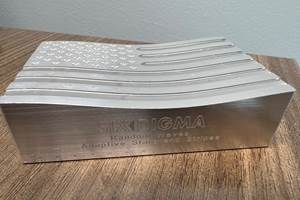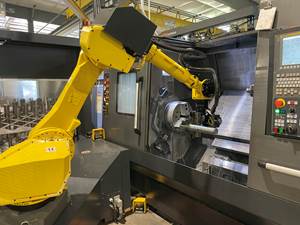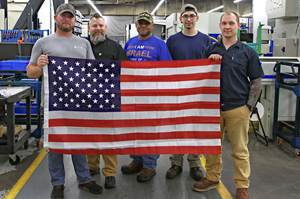Run for the School Board
Manufacturing leaders can do a lot of good within this elected office—for their communities, for young people and for their own businesses.
Share






What is the local elected office that has the most influence over the health of industry? Is it the town council? The mayor? Shop owner Matt Guse believes he knows the answer. He is currently serving his second three-year term as an elected member of the school board of Augusta, Wisconsin.
Mr. Guse is the president and owner of MRS Machining in Augusta. The school system in this city graduates about 40 students per year. He graduated from this system himself, and his own kids are now advancing through it.
He says his presence on the school board helps ensure that technical instruction receives consideration when the school system organizes academic priorities and allocates funds. Ignorance of manufacturing, not any bias against it, is the main reason why school systems often underserve those students who could be encouraged into manufacturing-related careers, he says.
That ignorance is not hard to address. Two to three times per year, he hosts the high school guidance counselor at his shop. During these visits, the guidance counselor sees the manufacturing work that former Augusta High School students are now doing, and learns about the aptitudes and personal traits that make a student a likely prospect for thriving in this type of work.
Mr. Guse says finding these students is another benefit of his elected office. In fact, this might be the chief benefit. Augusta High School seniors, as a requirement of their history class, each attend a school board meeting. Whenever these students attend, it gives Mr. Guse a chance to talk to one or more of them and possibly ask about their career goals. Sometimes he can even save one of those students considerable expense. Not every valuable job requires a college degree, he says, and students ought to know this. Positions like those in his company offer more income than many careers that do require college. He has seen employees who have found success at MRS use some of their wages to service tuition debt for college degrees that proved unnecessary for the work they now do.
To be sure, his small company hires relatively few people, and the requirements are specific. An employee at MRS needs strong mechanical aptitude, a desire to work with head and hands alike, and an uncommon level of attention to detail—among other strengths. However, when a student does possess the right innate set of gifts, Mr. Guse’s elected office sometimes puts him in a position to provide a way up. In one case, a student transferred into the Augusta system to get a fresh start after challenges in a previous school district. Mr. Guse knew of the situation because of his role on the school board, and he knew from the work of manufacturing that a person who seems to be struggling in school might be talented in ways that don’t come out in a school setting. That student has since graduated, and today he is a valued employee at MRS, where he programs and runs some of the most expensive CNC machines in Mr. Guse’s shop.
Related Content
Finding the Right Tools for a Turning Shop
Xcelicut is a startup shop that has grown thanks to the right machines, cutting tools, grants and other resources.
Read MoreBuilding Machines and Apprenticeships In-House: 5-Axis Live
Universal machines were the main draw of Grob’s 5-Axis Live — though the company’s apprenticeship and support proved equally impressive.
Read MoreSame Headcount, Double the Sales: Successful Job Shop Automation
Doubling sales requires more than just robots. Pro Products’ staff works in tandem with robots, performing inspection and other value-added activities.
Read MoreFinding Skilled Labor Through Partnerships and Benefits
To combat the skilled labor shortage, this Top Shops honoree turned to partnerships and unique benefits to attract talented workers.
Read MoreRead Next
Machine Shop MBA
Making Chips and 91ÊÓƵÍøÕ¾ÎÛ are teaming up for a new podcast series called Machine Shop MBA—designed to help manufacturers measure their success against the industry’s best. Through the lens of the Top Shops benchmarking program, the series explores the KPIs that set high-performing shops apart, from machine utilization and first-pass yield to employee engagement and revenue per employee.
Read MoreLast Chance! 2025 Top Shops Benchmarking Survey Still Open Through April 30
Don’t miss out! 91ÊÓƵÍøÕ¾ÎÛ's Top Shops Benchmarking Survey is still open — but not for long. This is your last chance to a receive free, customized benchmarking report that includes actionable feedback across several shopfloor and business metrics.
Read MoreAMRs Are Moving Into Manufacturing: 4 Considerations for Implementation
AMRs can provide a flexible, easy-to-use automation platform so long as manufacturers choose a suitable task and prepare their facilities.
Read More


















